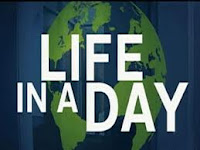Should I be happy that the kid with Down’s syndrome is not abused and joins other children’s games, even though these involve shouting waddisyouname at the village foreigner, who is now the most abused member of the village?
Should I be happy the music stopped, even though it just allows a clearer soundtrack of the howling hounds, crowing cockerels, pining pigs and hacking humans?
Should I be happy that “the worst national road in Cambodia” which links my village with the nearest town will be upgraded “in 2 years”, even though nobody can agree when the “2 years” starts (and it was “2 years” 2 years ago)?
Should I be happy to discover that the old tyre by the shack opposite is not rubbish but actually signifies it's a cycle repair shop, even though for the last year I’ve pushed my bike miles in the blazing heat to the only shop with a proper sign?
Should I be happy that I can leave my front door open without fear of thieves, even though it’s probably because I've nothing worth nicking?
Should I be happy that I have been accepted into the community, even if I know by being borderline assaulted by ‘friendly’ neck sniffing, hand-squeezing, ear-nibbling and buttock-fondling in a maelstrom of mandatory man-love?
In my hospital…
Should I be happy kids love the new playground we built by the children’s ward, even though I know by the volume of sweetie-wrappers strewn by the swings?
Should I be happy some staff came to the hospital this afternoon, even though they were so drunk they slept in the hammock whilst watching boxing on tv?
Should I be happy the toilets in the new children’s ward are so clean, even though it’s because they are always locked?
Should I be happy my nursing colleague Alison has a great new job in Phnom Penh, even though she’ll no longer be here in Thmar Puok to work with me?
Should I be happy contraception is clearly being used, even if the bins aren’t…?
Should I be happy villagers are combatting dengue fever, even if their efforts consist of building stuffed scarecrows to scare the evil sprits?
In my life...
Should I be happy the police agree I’ve been a model citizen for two years, even though to prove it I’ll have to break the anti-corruption law by bribing them for a certificate?
Should I be happy I have a gorgeous girlfriend right here in Cambodia, even though I only see her a couple of times a month as she lives more than a day’s journey away on the border with Laos?
Should I be happy I can now access the balance of my Travelex cash passport card on line, even though it shows me the thieving bastards are slyly deducting $4 a month from me for ‘inactivity’ in a country where they forgot to tell me none of the banks accept their crappy card?
Should I be happy I’ve got a sensible, secure, well-paid job back in the UK, even though I want to stay a crazy, footloose volunteer for ever?
In conclusion…
Should I be happy?





